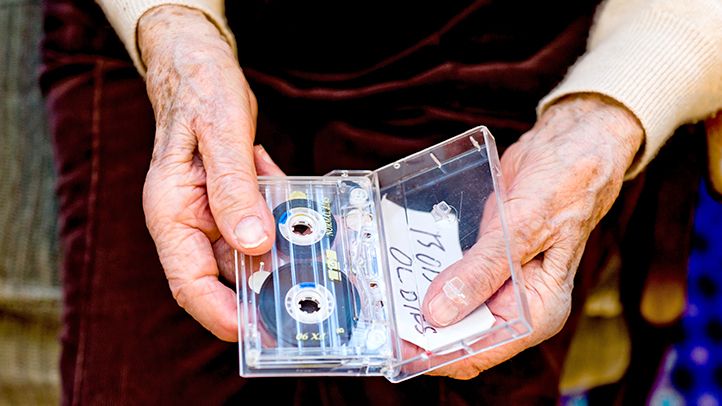There’s an increasing amount of anecdotal evidence that music therapy can significantly help many people with Alzheimer’s, with research beginning to confirm these observations and analyzing how and why music therapy works. Therapists are learning more about how to use music to access parts of the mind that remain largely unaffected, even as Alzheimer’s disease devastates other areas of the brain, with a few small studies confirming this effect through the use of magnetic resonance imaging (MRI) and other imaging methods. Read on to learn more about how music therapy works, how it may benefit people with Alzheimer’s, and the research behind it.
What It Is What Is Music Therapy? Music therapy isn’t listening to or making music for entertainment; it is a healthcare discipline. The American Music Therapy Association describes it as “the clinical and evidence-based use of musical interventions to accomplish individualized goals within a therapeutic relationship by a credentialed professional who has completed an approved music therapy program.”e60dc2a1-f33c-4a05-9b50-8e3e8e597629f4bdb87d-ebdb-454d-ac05-b8e86b29ec56 To put it more simply, music therapy is using different types of musical exercises with a qualified musical therapist. Different exercises include singing, playing an instrument, listening to or even writing music, and discussing lyrics.e60dc2a1-f33c-4a05-9b50-8e3e8e597629f93e4137-b1f7-47bd-8fbd-77556e6b8299 So many of us “respond to music in some way, shape, or form, whether it’s a physical response, an emotional response, a social response, or a cognitive response,” says Joy Allen , chair of the music therapy department at the Berklee School of Music in Boston. “We know that in dementia, the brain is damaged, but the part that responds to music is one of the last that seems to go.”
How It Works How Does Music Therapy Work? In music therapy you will work with a qualified musical therapist over a series of sessions. Before deciding on what types of music therapy to use, the therapist will work with you to assess your needs and strength. They may also discuss things like your emotional well-being, physical health, and cognitive skills. And of course they will have a conversation with you about your musical skills and preferences.e60dc2a1-f33c-4a05-9b50-8e3e8e597629b03e313a-7534-4a35-875c-61ad4703041a There are many forms of music therapy, but they can be broken down into two types: active interventions and receptive interventions. Active interventions involve actively making music with your therapist, either playing an instrument, singing, or composing. Receptive interventions involve listening to music and potentially discussing it as well.e60dc2a1-f33c-4a05-9b50-8e3e8e5976297df2f3a7-880a-462f-9c9f-0ba591a28d52
Benefits Benefits of Music Therapy for Alzheimer’s Music therapy for Alzheimer’s dementia can take many forms. Listening to Music A music therapist also has methods for making listening to music beneficial. “The person can be sitting in their chair, and you can be moving with them in rhythm, which is going to help activate a connection,” Allen says. “But the key is, you have to use that music effectively. You don’t want it in the background all the time, because then the person tunes it out. You want to use it in ways that are purposeful and meaningful, making sure that the music is also culturally relevant to the person. It’s going back and seeing the different roles music has played throughout their lives, because that’s what they connect to.” Singing “We do find that singing is definitely a big thing,” Allen says. “With singing there’s the predictability of rhythm that is soothing. But also, if you think about it, you have to breathe when you’re singing, and that has a relaxing quality to it, too.” As dementia advances, music’s calming quality can decrease agitation during anxiety-producing events of daily life and make transitions less fraught for both those with Alzheimer’s and their caregivers. “So if you need a person to walk, by singing something familiar like ‘When the Saint Go Marching In,’ the focus is on the reward of the song instead of the discomfort of what they’re doing,” says Allen. Dementia Choirs Singing can also offer social connection, which helps explain the rise of “dementia choirs” around the country made up of people with early to middle-stage Alzheimer’s, and sometimes their caregivers too, as profiled in one study.e60dc2a1-f33c-4a05-9b50-8e3e8e59762933d48f26-0f7a-4e3d-8901-aeb9cdc82672 “With dementia choirs, it’s no longer, ‘Do you know my name?’ or ‘Tell me what day it is.’ It’s ‘Hey, we can enjoy each other’s presence and companionship,’” says Allen. As everyone sings together it becomes clear that a person with Alzheimer’s is still a person, and not just their disease. Allen adds that even people with dementia who have trouble finding the right words in conversation may have an easier time recalling lyrics to a familiar song. Drumming Drumming circles with percussive instruments such as egg shakers are another type of group activity that may help people with dementia. “You don’t have to know anything fancy or complicated. You just have to know a heartbeat — it’s that simple motor response,” Allen says. “And that goes back to the principle of entrainment, where your body and your brain and your central nervous system are automatically activating to create purposeful movement.” That active rhythm provides predictability (“It’s a time sequence; you know what’s going to happen,” Allen explains), which can decrease tension and agitation.
Research Research Behind Music Therapy for Alzheimer’s While enrolling people with dementia into clinical trials has proved challenging, research has found that music therapy can lead to improvements in behavioral, cognitive, and social functioning.e60dc2a1-f33c-4a05-9b50-8e3e8e597629079a4501-98da-4425-b5df-fd484417d827 This in turn is helping allay anxiety and depression and reducing the use of anti-anxiety and antipsychotic medication in nursing homes and assisted living facilities.e60dc2a1-f33c-4a05-9b50-8e3e8e5976296e12701f-ce80-4686-bc23-9c8a1dc14a0d The Music & Memory program , run by a nonprofit founded in 2006 by a social worker named Dan Cohen, is another example of how music therapy is proving to be a great success in treating people with Alzheimer’s. Music & Memory hinges on the unique power of songs that are specific to each patient’s personal preferences and history. Giving someone with dementia the opportunity to listen to “their” songs through headphones connected to iPods or other portable listening devices can arouse strong positive emotions and stimulate the brain. While studies have been limited by size and other variables, there have been a number of encouraging findings. One study found that nursing homes that used Music & Memory saw significant improvements in behavioral symptoms of dementia as well as a notable decline in the amount of anti-anxiety and antipsychotic medications they gave patients.e60dc2a1-f33c-4a05-9b50-8e3e8e5976298ebc7565-c41e-4c5b-9ca6-f6c5329145fd “It’s really quite remarkable,” says Norman Foster, MD, a geriatric neurologist and director of the Center for Alzheimer’s Care and Imaging Research at University of Utah Health. Dr. Foster is senior author of a small study published in 2019 in the Journal of Prevention of Alzheimer’s Disease that used functional MRI to scan the brains of subjects with Alzheimer’s as they listened to personally meaningful music. The scans revealed that the experience caused different regions of the brain to communicate, including the visual network, salience network, executive network, and cerebellar and corticocerebellar network.e60dc2a1-f33c-4a05-9b50-8e3e8e597629362c4f54-1381-431d-a64d-5be1ad63b074 A more recent review study looked at the research around music therapy and Alzheimer’s and the researchers concluded that music has the power to help patient’s recall memories, even if they aren’t directly related to the music in question. This in turn can help them preserve a sense of personal identity, improve mood, reduce depression and anxiety, improve memory recollection and verbal fluency, as well as enhance overall cognitive function. The researchers note that high quality, larger studies are still lacking, but there is great promise to this low risk treatment method for Alzheimer’s.e60dc2a1-f33c-4a05-9b50-8e3e8e59762971fac419-9a86-4161-a59f-3c32d965c176
The Takeaway Music therapy involves working with a music therapist and using music in a series of sessions, to treat several health conditions. Sessions could involve listening to music, singing, or playing an instrument. Music therapy for Alzheimer’s shows a lot of promise, and may improve sense of identity, mood, and reduce mental health conditions associated with Alzheimer’s, such as anxiety and depression. Research also suggests it could help improve cognitive function, recall, and verbal fluency. There is a lot of promise around music therapy for Alzheimer’s, but better quality research is needed to confirm its use as an effective treatment method.
Resources We Trust Cleveland Clinic: Music TherapyCleveland Clinic: Music Therapy Affiliated Programmes Mayo Clinic: Alzheimer’s DiseaseMayo Clinic: Alzheimer’s Disease: What’s on the Horizon?National Institutes of Health: How is Alzheimer’s Disease Treated?
Read the full article here
Leave a comment




